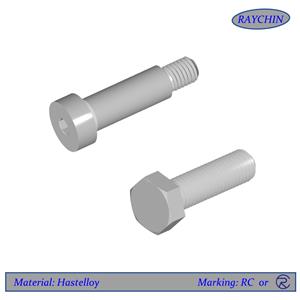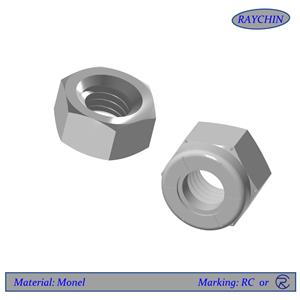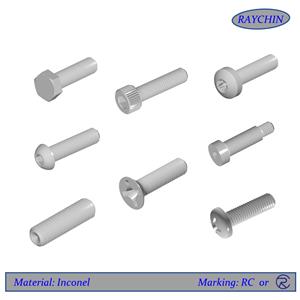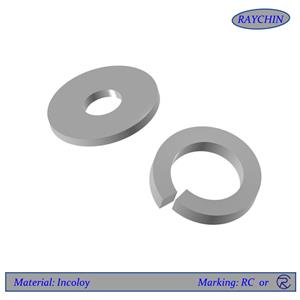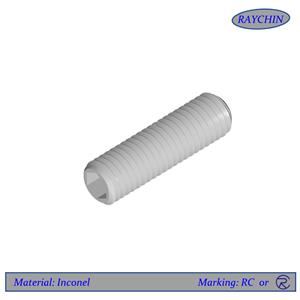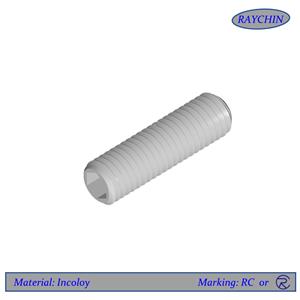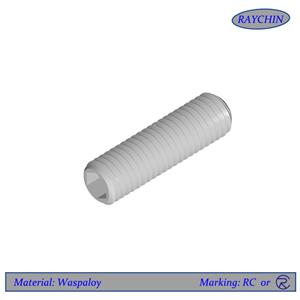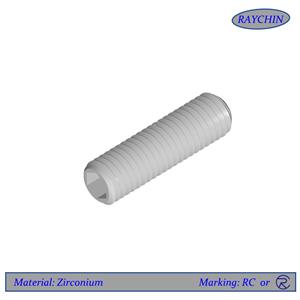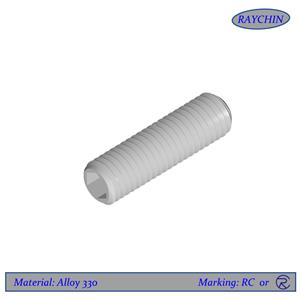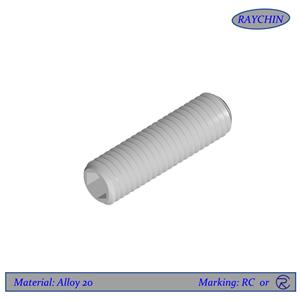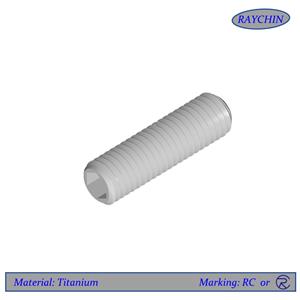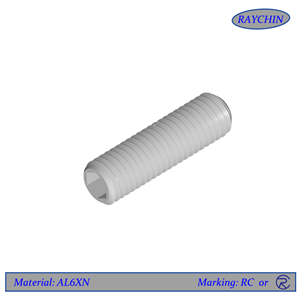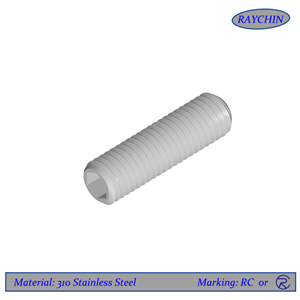-
Inconel Set Screws
Inconel® set screws, like Inconel 600, 601,625,686,718 & 725 screws, are a family of nickel-chromium-molybdenum alloys used for their high strength at elevated temperatures and good corrosion resistance. Because of its high thermal stability, Inconel can be used in service temperatures ranging from cryogenic to 2200°F (982°C). The high alloy content of Inconel set screws enable it to withstand a wide variety of severe corrosive environments. In mild environments, such as the atmosphere, sea water, neutral salts, and alkaline media, there is almost no attack to Inconel screws. In more severe corrosive environments the combination of nickel and chromium provides resistance to oxidizing chemicals, whereas the high nickel and molybdenum contents supply resistance to nonoxidizing environments.
Send Email Details -
Incoloy Set Screws
Not to be confused with Inconel, Incoloy set screws are made of a nickel alloy which contains iron and a lower content of nickel. Incoloy is essentially a more economical option to Inconel, yet with more restricted corrosion resistance and temperature limits. Typically, Incoloy is an ideal material for long-term exposure in high temperature environments due to its oxidation, carburization and creep resistance. Incoloy is widely used for its resistance to seawater, brine, sour gas and high chloride environments at elevated temperatures, which make it a popular choice in the oil and gas and power industries.
Send Email Details -
Waspaloy Set Screws
Waspaloy set screws are known for their superb high strength at elevated temperatures. Waspaloy is a high performance nickel alloy combined with cobalt, chrome and molybdenum to create it’s unique combination of strength and high temperature stability. Similar to that of Inconel 718 screws, Waspaloy set screws exceed the strength and stability of Inconel 718 at elevated temperatures beyond 1400°F. In addition, the oxidation resistance of Waspaloy screws make it an ideal materials for high temperature applications like gas turbines engines, and a variety of other aerospace components.
Send Email Details -
Zirconium Set Screws
Commercially pure zirconium set screws, also known as zirconium 702, are most well-known for their superior corrosion resistance in some of the harshest environments that include: • Hydrochloric Acid• Sulfuric Acid• Formic Acid• Nitric Acid • Acetic Acid It is also a metal that offers industry unique properties. It does not absorb neutrons, making it ideal for use in nuclear power and at low temperatures it is superconductive, making it ideal for super magnets.
Send Email Details -
Alloy 330 Set Screws
Alloy 330 set screws are specifically designed for high temperature furnace applications such as vacuum furnaces, heat treating and brazing applications. The most prized trait of alloy 330 is its ability perform under cyclic conditions of temperature extremes from heating and cooling; as well as in alternate carburizing and oxidizing atmospheres. An austenitic nickel-chromium-iron-silicon alloy, 330 set screws also offer industry a low coefficient of expansion, excellent ductility, and high strength.
Send Email Details -
Alloy 20 Set Screws
Also known as Carpenter 20 and 20CB-3, Alloy 20 set screws offer users a combination of nickel, chromium, molybdenum, and copper which provides good general corrosion resistance. Alloy 20 set screws are best suited for mid-range corrosion use – better than steel alloys but not at the level of high performance nickel based alloys like Hastelloy C276. Alloy 20 is a nickel alloy that was specifically designed to withstand the harsh environment of hot sulfuric acid but also performs well in a variety of other acids. Alloy 20 set screws are an ideal choice when you don’t need the corrosion resistance power and price-tag of high performance nickel alloys like Hastelloy C276; but you need something that will give you more protection than 316 stainless steel or even a Super Duplex 2507 stainless steel.
Send Email Details -
Titanium Set Screws
Titanium fasteners are best known for being strong, lightweight, and corrosion resistant. They are critical to many industries including chlor alkali, marine, off-shore oil & gas, desalination, medical, and pulp and paper. Grade 2 and 5 are the most commonly used grades of titanium screws: • Grade 2 (UNS R50400 / 3.7035) :Commercially pure titanium and the most common grade for screws. • Grade 5 (UNS R56400 / 3.7165): Superior strength-to-weight ratio for a unique combination of corrosion and high strength.
Send Email Details -
AL6XN Set Screws
Originally developed to combat sea water corrosion, AL6XN has expanded its role as being good mid-range corrosion resistant alloy. AL6XN set screws are a low carbon, high purity, nitrogen-bearing "super-austenitic" stainless alloy. Also considered a 6Moly alloy, AL6XN is similar in chemistry and capabilities to Alloy 926 and SMO 254. With a higher nickel and molybdenum content than Duplex 2205 and Super Duplex 2507, it delivers better corrosion resistance while giving a more cost effective alternative to nickel super alloys like Inconel or Hastelloy in moderately corrosive conditions.
Send Email Details -
310 Stainless Steel Set Screws
Designed for high temperature applications, 310 stainless steel set screws provide high temperature oxidation resistance to 2000°F under mild cyclic conditions. An economic alternative to nickel alloys like alloy 330 or Inconel, 310 set screws provide slightly less strength and temperature resistance – but at a significantly lower price point. Alloy 310 screws can be used in moderately caburizing, moderately oxidizing, nitriding, cementing and thermal cycling applications when not used at the maximum service temperature. 310SS set screws also have good resistance to sulfidation and other forms of hot corrosion. Although primarily known for its high temperature properties, 310 screws also provide excellent performance at cryogenic temperatures, with toughness down to -450˚F. Though 310 is ideal for high temperature use, it should not be exposed to the severe thermal shock of repeated liquid quenching or where aqueous corrosive contaminants are present.
Send Email Details

